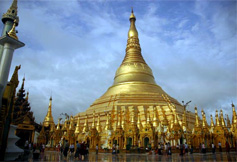Commissioner Piebalgs in Burma/Myanmar on 12-14 February

Commissioner Piebalgs will visit Burma/Myanmar on 12-14 February. He will be the first Commissioner to meet the President. Since the impressive reform agenda began to take shape after the new civilian Government took office, the EU has repeatedly said it would support reform. Therefore, he will announce additional funding from the EU to encourage the transition and to assist the country's fight against poverty. During the visit he will travel to Nay Pyi Taw and Yangon to meet the President, senior government ministers, Aung San Suu Kyi and other important interlocutors. The visit will allow assessing the progress on the ground, to further encourage reform and to gauge how the EU can even better support the change process.
In addition to the high level meetings, the Commissioner will speak at the Development Policy Options Conference to explore how to promote inclusive human development and growth.
During the trip, the Commissioner will also meet key implementing partners of the EU aid projects, visit an EU funded health clinic and will speak at the Development Policy Options Conference, an event, co-funded by the EU, to explore how to promote inclusive human development and growth. Other participants of the conference include the German Minister for Economic Cooperation and Development, Dirk Niebel.
This visit follows the Foreign Affairs Council (FAC) meeting in Brussels on 23 January, and the European Council Statement of 30 January, where Member States welcomed the remarkable programme of political reform undertaken by the Government and Parliament. This included, among others, the release of a substantial number of political prisoners and ceasefire agreements with ethnic groups. In addition, the Council welcomed the dialogue between the President and Aung San Suu Kyi and changes to the electoral law, allowing the National League for Democracy (NLD) to participate in elections on 1 April.
In response to these reforms, the Council decided as a first step, that the travel ban (visa restrictions) on the President, the Vice-Presidents, Cabinet Members and Speakers of the Houses of Parliament should be suspended. Continued political progress could lead to a further easing or lifting of restrictive measures by the end of April. The European Union wishes to assist Burma/Myanmar in advancing reforms by increasing development assistance to reduce poverty and assist in building necessary capacity of a state. An EU mission will also open in Yangon in the near future.















